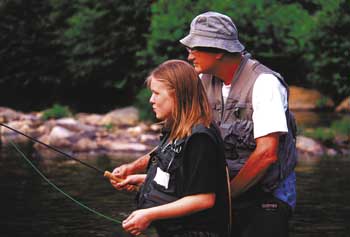
The seeds for a lifetime of fishing are sown at an early age.
In fact, 90 percent of adult freshwater anglers started at age 12 or younger. 96 percent started before the age of 18. Only 4 percent of adult anglers actually picked up the sport as adults. So it stands to reason if a youngster doesn’t learn to use a fishing rod before he or she gets a driver’s license, it’s unlikely they’ll become an angler as an adult. Obviously, it’s important that kids get introduced to fishing.
Why? Because youth involvement in fishing today will determine the quality of fishing for the future.
The sport of recreational fishing is declining. If you think this is good news for you because there’ll be less fishing pressure down at your favorite fishing hole, think again.
With only a handful of exceptions, sales of fishing licenses in states across the country are either stagnant or declining — including here in South Carolina. These license fees pay for fisheries and resource management, at many different levels throughout the state — biologists, stocking programs, access to water, research, enforcement, and more. The quality of our fishing experience depends greatly upon these funds.
Resource managers across the country attribute the stagnant and declining license sales to increased urbanization, lack of convenient access to fishable waters, and people spending more of their leisure time doing other activities. This is particularly true for kids.
In today’s world, it’s difficult to become an angler. The Recreational Boating and Fishing Foundation has identified five conditions that must be met before a kid takes up the sport of fishing and becomes an angler:
1) An introduction. Someone must introduce the youth to fishing. It is also important that the initial introduction be a positive experience.
2) The youth must have access to fishing equipment.
3) The youth must have access to a fishing location. With increased urbanization, this can be exceeding difficult.
4) The youth must have a mentor. Traditionally, this has been a male family member.
5) Social support.
But social trends don’t bode well for these conditions.
Extracurricular and after-school activities for youths are much more structured around time and organization.
A recent Newsweek article described how youths today are leading stressful, active lives having to choose scheduled activities — half day of school, one hour of music lessons, two hours of soccer practice, two hours of computer time — as parents act as chauffeurs driving then from one scheduled activity to another.
A friend recently headed up a grassroots outreach program in a big western city to promote the sport of fishing to youths. After she gave a presentation to a group of parents, one mother, who was clearly moved, walked up and gushed about how wonderful it would be to get her youths involved in fishing. She then asked where she should go to sign them up.
In today’s world, it seems youths just don’t have the time that fishing requires. As John Gierach said” “Fishing IS time consuming. That’s kind of the whole point.”
Increased urbanization, as well as changes in the family structure and single-parent households, have affected angler recruitment among youths.
Traditionally, fishing was passed from one generation to the next — usually by the father, grandfather or uncle. Youths need that type of introduction, mentoring and social support to mold them toward taking up fishing as a hobby or sport. Yet it’s missing in many homes.
On the other hand, several radical animal rights groups fund programs to turn children away from fishing.
People for the Ethical Treatment of Animals is a large, influential organization that is targeting youths in schools with literature that compares fishing with killing the family pet. On the cover of their brochures is a scowling fisherman, with fishing hat, fishing rod, and vest, gutting a fish with the headline, “Your Daddy Kills Animals.”
On the back cover, it concludes with, “Until your Daddy learns that it is not fun to kill, keep your doggies and kitties away from him. He is so hooked on killing defenseless animals that they could be next!”
That might seem laughable to us, but impressionable youths are easily influence by radical ideas, particularly those that seem to denigrate the concepts of their parents or adult society.
The point is simple: There are forces out there working against the future of sportfishing and sportsmen and sportswomen. We must do all we can to pass the angling tradition to the next generation, even if we do it one youth at a time.
As I pointed out in the opening paragraph, if a youth
doesn’t pick up a fishing rod before he or she picks up their drivers license, they’re gone — gone as a lifetime funding source for fisheries resource management and as an advocate for protecting access to water and the fishing locations we love, including that favorite fishing hole we were afraid of sharing.
Take a youth fishing. Be a mentor. Volunteer for a local youth’s fishing rodeo. It’s up to you.



Be the first to comment